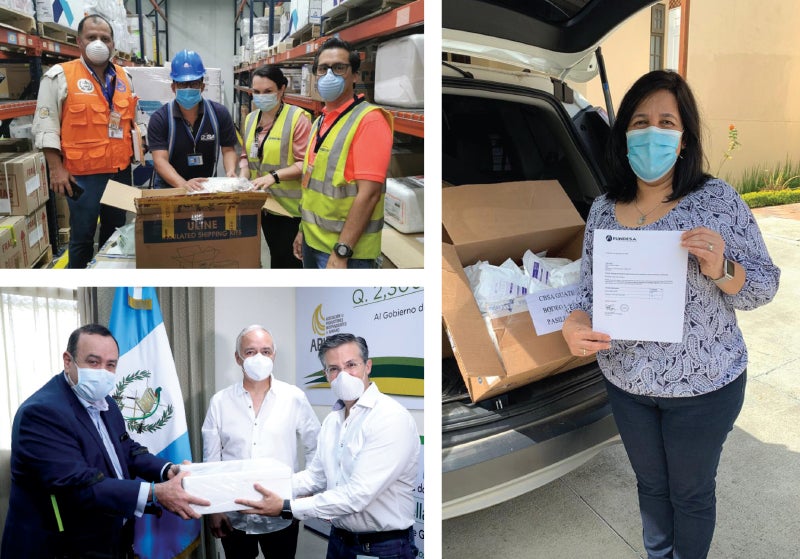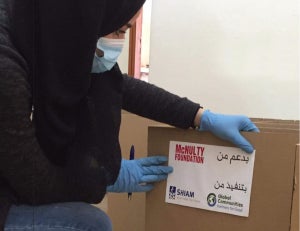 When crisis strikes, values-based, purpose-driven leadership can make the difference between a struggle and a disaster. As the pandemic spread across the globe, Aspen Global Leadership Network fellows stepped up to act and meet the needs of their communities. Fellows have deeply examined the fundamental values and beliefs that compel them to act. Tests like these are what their journeys prepared them for.
When crisis strikes, values-based, purpose-driven leadership can make the difference between a struggle and a disaster. As the pandemic spread across the globe, Aspen Global Leadership Network fellows stepped up to act and meet the needs of their communities. Fellows have deeply examined the fundamental values and beliefs that compel them to act. Tests like these are what their journeys prepared them for.
With a long history of supporting fellows and high-impact ventures, the John P. and Anne Welsh McNulty Foundation partnered with the AGLN to offer rapid-response support to fellows through the Global Response Fund. The McNulty Foundation has pledged up to $1 million in funding. To date, the fund has supported 70 fellows’ organizations with $750,000 directly helping vulnerable communities in the United States and over 20 other countries.
The key to success was the leaders’ connection to the communities they served. Their quick responses were made possible by years of groundwork forming long-term relationships and deep understanding.
In New York City, the first US epicenter for Covid-19, the East Harlem COAD, supported by Health Innovators fellow Ann-Gel Palermo, linked local business owners, volunteers, and community leaders to quickly communicate needs in the neighborhood—a capability that scaled rapidly and ensured businesses could survive and citizens remain safe in a densely populated low-income borough.
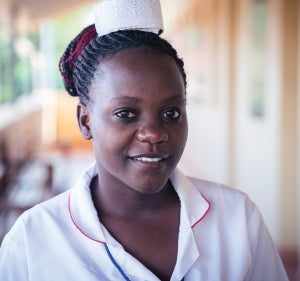 In the West Bank, the organization Shiam, led by Middle East Leadership Initiative fellow Lana Abu-Hijleh, tapped youth democracy groups to distribute groceries, personal protective equipment, and information on how to stay safe to communities bordering Israel—where many people work and where employment was massively disrupted by quarantine. Operating in Uganda’s already fragile health care system, Liberty fellow Matthew Alexander and OneWorld Health partnered with communities on the local level to employ skilled medical professionals from the community and to fortify health systems so that they could remain open and provide quality and affordable health care.
In the West Bank, the organization Shiam, led by Middle East Leadership Initiative fellow Lana Abu-Hijleh, tapped youth democracy groups to distribute groceries, personal protective equipment, and information on how to stay safe to communities bordering Israel—where many people work and where employment was massively disrupted by quarantine. Operating in Uganda’s already fragile health care system, Liberty fellow Matthew Alexander and OneWorld Health partnered with communities on the local level to employ skilled medical professionals from the community and to fortify health systems so that they could remain open and provide quality and affordable health care.
Connections between fellows also played a critical role. A joint effort sparked by two Henry Crown Fellows, Devon Spurgeon and Blair Christie, resulted in Project Isaiah, an initiative that addresses both job loss and food insecurity. Partnering with local restaurants, which would have otherwise laid off staff, to provide meals to families in need, the initiative connects prepackaged airline meals with domestic-violence shelters, food banks, senior housing facilities, and other nonprofits in 11 major US cities.
Although the immediate dangers presented by the pandemic were front of mind, fellows also took quick action to begin reimagining a post-Covid-19 world that addresses the deeply entrenched systemic and structural issues that were an accelerant to this crisis. In New Orleans—a city still scarred by the unequal help given to citizens after Hurricane Katrina—the Campaign For Equity, led by Civil Society fellow Shawn Barney, helped draft many recently unemployed people as contact tracers and other relief workers. The Campaign for Equity is also ensuring that the funds and programs being put in place help the city solve preexisting inequities rather than keep them in place or worsen them.
On the following pages, please find contributions from a few of these talented fellows.
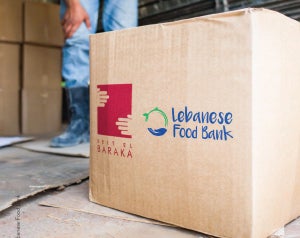 LEBANESE FOOD BANK | WALID MAALOUF
LEBANESE FOOD BANK | WALID MAALOUF
Middle East Leadership Initiative Fellow
Providing food on a daily basis to families and individuals in Lebanon
I can safely say that the past year has been a major milestone for the Lebanese Food Bank. As Lebanon experiences one crisis after another, our organization has constantly adapted to both external and internal circumstances. When the people of Lebanon took to the streets in 2019 in political protests, the country already suffered from nearly a third of its population living in poverty. A currency devaluation rapidly pulled more people into poverty. As Covid-19 hit the country a few months later, we had to stop all programs that were putting the health of our team and beneficiaries at risk, while dramatically scaling operations to respond to the country’s needs. International agencies estimate that 50 to 65 percent of the Lebanese population now lives in poverty, putting more pressure on us to respond.
By boosting our collaborative efforts both nationally and internationally and connecting with the Lebanese diaspora, we went from serving eight geographical districts to covering all 26. As a result, we carried one of the largest national food-relief campaigns, successfully distributing some 50,000 food boxes to 200,000 people in three months. Then, on August 4, the explosion in Beirut’s port challenged an already dire situation. This event of historic proportions forced us to widen our scope. Now we’re supporting 120 nongovernmental organizations and growing.
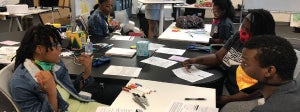 CREATIVE REACTION LAB | ANTIONETTE CARROLL
CREATIVE REACTION LAB | ANTIONETTE CARROLL
Civil Society Fellow, a partnership between the Anti-Defamation League and the Aspen Institute
Providing hyper-local microgrants for Black and Latinx youth, their families, and their communities disproportionately impacted by the pandemic
As a Black woman and social entrepreneur, I’m constantly grappling with my duality of privilege and targeted identities—having to think about how I can leverage my access for historically under-invested communities like the one I grew up in. Through my experience in building a movement of Redesigners for Justice, who address issues of race and health in communities, I’ve learned the power of centering folks in the closest proximity to issues as the decision-makers we need. Building on this lesson and our own experiences at Creative Reaction Lab, we’ve found that youth have been the architects of change throughout our communities. So when Covid-19 and its impact in the United States further exacerbated the disparities across health, technology access, and housing, we began to ask, “How can we support and amplify Black and Latinx youth in addressing the hyper-local realities of Covid-19 in communities of color?”
Long-standing systemic health and social inequities have put historically under-invested groups of color at increased risk of getting Covid-19 or experiencing severe illness, regardless of age.
In our rapid response to the new normal, Creative Reaction Lab launched a microgrant supporting these redesigners and their Covid-19 needs: the Youth Creative Leadership Fund. YCLF launched out of a need to protect Black and Latinx families being disproportionately affected by Covid-19 in the United States by providing $100 microgrants for youth, their families, and their communities in categories including self-care, creative
projects, and passing it on to an individual or organization in need. As of July 2020, microgrants have provided 241 youth leaders under the age of 26 with $25,700 in emergency funds, with 112 more being supported by the end of 2020.
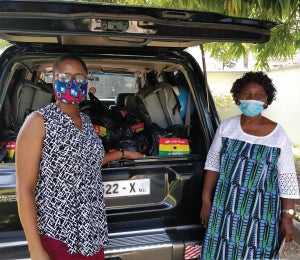 ASSOCIATION OF GHANA’S ELDERS | ESI ANSAH
ASSOCIATION OF GHANA’S ELDERS | ESI ANSAH
Africa Leadership Initiative, West Africa Fellow
Building an ecosystem of services to ensure that Ghana’s elders age with dignity, and continuing to have an active and productive stake in their communities
Association of Ghana’s Elders, or “AGE,” started the year off with a lot of energy and were busy scheduling visits with various retiree groups on a monthly basis—until March came along and Covid-19 grounded our work, essentially cutting us off from the senior citizens we sought to serve. The restricted movement meant that our elders were stuck at home, alone, living in fear, unsure of how things would go. On our WhatsApp platform, I saw misinformation on the pandemic caused further fear and panic among the community. We engaged with some people directly to allay their worry, but that was not enough.
The solution we came to was quite simple. We organized an online Zoom meeting for elders to meet and chat. Our elders were thrilled that they finally got to take part in a virtual meeting. Now, these virtual meetings occur once a month and are ensuring the community does not feel alone and that the elders’ mental health stays positive. In addition, we are excited to launch our Buddy Program to connect seniors with “juniors” who will check on them, keep them company, and share what’s going on in the world around them.
MARIA KALTSCHMITT, MARIA ISABEL LUJAN, LUIS PRADO, JOSE MIGUEL TOREEBIARTE, SALVADOR BIGURIA, ROBERTO PAIZ
Central America Leadership Initiative Fellows
A collaboration of fellows working to support Guatemala’s fight against Covid-19
Juan Carlos Paiz: Since the beginning of the pandemic, our government acted quickly to institute lockdown measures and physical distancing. Face masks are also mandatory all over the country. I believe these measures helped control the number of positive Covid-19 cases Guatemala has experienced, but because of international demand, testing—specifically real-time PCR testing—was scarce.
With collaboration among seven Central America Leadership Initiative Fellows, FUNDESA, a Guatemalan nonprofit think and do tank, launched a national campaign to provide these tests to the public hospitals. With my fellow fellows, we were able to raise $2.3 million, and we distributed 67,220 PCR tests, 70,500 swabs, and 49,000 extraction kits, as well as other supplies for the public hospitals. FUNDESA is now supporting the Health Ministry to increase test acquisition, and we are implementing a study to understand the percentage of people who already have Covid-19 antibodies. We are also working with the Ministry of Economy in an economic recovery plan to establish key sectors that can increase investment toward Guatemala. Partnering with government ministries has presented a great opportunity to increase jobs and recover the Guatemalan economy that was affected during this health crisis.”
